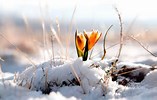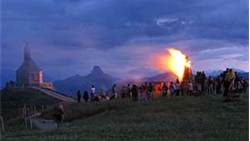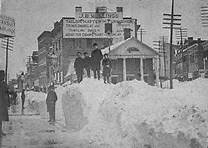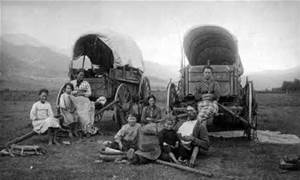
The Tattered Hem of Winter
For me, there are three kinds of winters. The first kind is the rainy, gray, damp, but relatively mild winter of England and Germany; the second the long, harsh, exhausting winter of Northern Sweden, Finland, and Russia; and the third the winter of my childhood, of the Northeastern United States, which can be both damp and rainy or cold and snowy often all within the same day. Recently, however, both the severity and length of the cold season here in the Northeast has become so intense, that my Connecticut winters are blurring into the ones I spent in Northern Europe and Russia: the long winter of 1985 in Finland, or the winter of 1998, the coldest winter Russia had seen in twenty years.
And the worst part of the winter, as we all know, is not the beginning (we all love the first snowfall), or the relentless storms of February. The worst part is now, the lightening days of March with piles of dirt-encrusted snow still on the ground, a cold wind blowing the sap-filled trees, and the temperature plunging in the evenings to freeze the day’s snowmelt into ribbons of black ice to hamper the morning commute.
March (not April) has always been the cruelest month, and not just for those of us who nowadays wish we could have spent the winter in Florida or Arizona. It was always cruel for those who truly had to survive a winter. Wild animals, Native Americans, settlers, who famished from the enforced winter fast, would creep from their lairs as the days slowly got longer often only to perish looking for food that was not yet there.
The Russians have the right idea, I think. On the first of March, they celebrate Maslenitza, their pre-Lenten butter festival. The first of March in Russia is not a day to be confused with spring, but the Russians stubbornly celebrate it as its beginning. Demonstrating their contempt for the limitations freezing weather impose upon the human body, they celebrate it outside. I remember standing on what felt like, and could very well have been, a vast block of ice surrounded by a large crowd of festive, laughing people. We were listening to group after group of elaborately-dressed women in traditional Russian costumes sing Russian folk songs. These singers were all on an elevated stage that exposed them to the whipping winds blowing into the city off the Eastern steppe. All these years later it still sticks in my mind that the best group we heard that day was a group from Germany who sang in flawless Russian. What were they doing there, I still wonder? What were they doing so many miles from home on a freezing March day celebrating the elusive Russian spring?
To go with the singing, there was of course food. The traditional blinis, large round suns of flour and yeast fresh off the butter-slathered outdoor grills, dripping with heavy Russian honey. We ate them folded over into quarters, like sandwiches. When the singing was over, we bought a bottle of Russian champagne and went back to my apartment to get warm and play with my cat, Pushkin. In the evening, I walked my guests, one of my students and her new boyfriend, to the street corner. I remember the boy carrying his guitar in one hand while running to jump into the moving bus. I remember him slipping on the icy street. Walking home, I consoled myself that I had now made it to Maslenitza and that the harsh temperatures would have to loosen their hold on us soon. It seemed like the city had been under a thick layer of snow forever. Memories of the yellow birch leaves of October, or the steamy temperatures of August, seemed ancient, like something that had happened to me as a small child.
Out on the Plains of the American Midwest, in Nebraska, where the winters have always rivaled the long, brutal winters of Russia, Willa Cather wrote in My Ántonia of their sorry end: “Winter lies too long in country towns; hangs on until it is stale and shabby, old and sullen. Through January and February, I went to the river on clear nights, and we skated up to the big island and made bonfires on the frozen sand. But by March the ice was rough and choppy, and the snow on the river bluffs was gray and mournful-looking. I was tired of school, tired of winter clothes, of the rutted streets, of the dirty drifts and the piles of cinders that had lain in the yards so long.”
Tired of it. That’s the main thing one feels in mid-March. An ever-present tiredness, a languor and an exhaustion, yet in my case also a welling up of nostalgia for the fraying season, for the soon to be lost inactivity of winter afternoons when all I need do after I get home from school is make a cup of hot tea and read a good book in a warm bath. I begin to long for the fires of winter nights even as I still sit in front of them. I mourn the season of reduction, of turning in upon oneself, of reflection.
Mid-March. Soon enough there will be the frenzy of spring yard cleaning, of raking the stones of the driveway out of the lawn they were plowed into, cleaning the dead leaves and fallen branches from the grass, sweeping the salt from the front stoop. Soon enough will come the time of assessing the winter damage: what trees have split and fallen, what bushes were torn asunder by the high drifts, what pieces of the deck or house have warped or buckled in the freeze and thaw and now lie moldering upon the ground. There will be planting, pruning, weeding, checking for green flies and caterpillars that already on the first warm days congregate on the tiny rose buds. There will be repeated trips to the nursery to purchase geraniums and petunias to fill the terra cotta pots.
And all of this will be wonderful and exhilarating, the feel of soft spring air on shriveled winter skin, the smell of damp earth rising up from the woods, the sound of rushing water in swollen streams.
But it’s okay with me if we still have a few more weeks of waiting for this to happen, of allowing my head to swell pleasantly with books and plans. It’s okay with me to watch the tattered hem of winter trail slowly past over the ravaged ground, on its way north to wait for the next cold season to return.





I agree!! Beautifully crafted description, as always!
Thank you!
I love this, as I always love your blogs — about “the tattered hem” I especially adore your description of what you will miss, or are already missing, about the deep relaxation of winter months; how our interior lives are lit as we sit by a fire, or take a long bath with a good book, exterior demands of disheveled yards and the call of a sunny afternoon still months away. Exactly!
It is unfashionable to say it, but I like winter!
This is great. I don’t know which is worse: My Seasonal Affective Disorder in the fall as the days grow shorter and colder or March when winter seems to hang on and hang on and hang on.
Beautifully written, as always, Linda. March is the cruelest month, filling us with hope, then dashing our spirits against another frigid day. In winter I luxuriate in the early darkness and the freedom from yard maintenance, which will be too soon become a priority.
Puts our situation IN PERSPECTIVE. I DON’T REMEMBER WINTER LINGERING THIS LONG HERE.
I refuse to think about winter!!! Great blog.